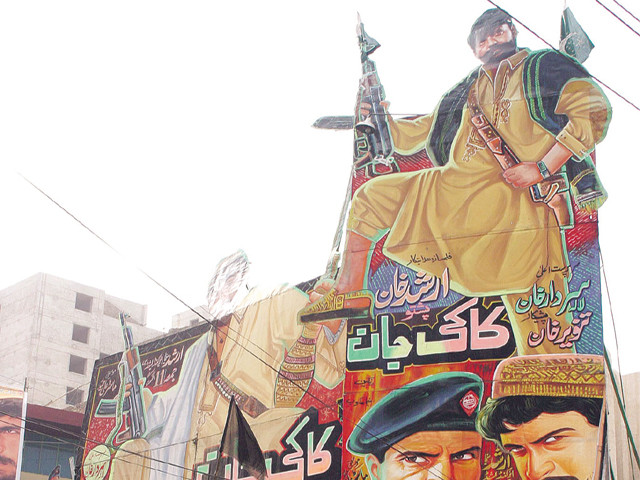Pashto films plagued with issues
Pashto filmmakers are attempting to reverse years of damage done to the industry but there is a long road ahead.

The industry, which was known for stalwarts such as Badar Munir, has been eroded. It has been replaced by a collective of producers who make direct-to-CD films that are low-budget, shown on cable networks in the province and are also sold abroad. Since this parallel industry is not structured, the films are not subject to any censor restrictions.
The few filmmakers left, say they are attempting to produce new films.
Director Ajab Gul says he uses cinema to promote pride in his culture and provide an outlet for young men at risk of being lured to militant causes.
“The young generation is illiterate and unemployed and has a lot of problems. They need to be involved,” says the 45-year-old former actor.
“If you do not entertain and pay attention to the youth they will end up in terrorism.”
Filmmakers brush aside fears of attacks, but working with ageing equipment and desperate to keep their loss-hit industry alive, they admit the sector is in financial crisis. But it was not always that way.
The first Pashto film, made in India in the 1930s, was an adaptation of Laila Majnu and preceded the industry’s 1970s heyday when a series of classical tales were adapted for the big screen.
But in the 1980s a new type of Pashto film was born that Gul and his actors say damaged the industry with its sexed-up love scenes - heavy on dancing and light on plot, in a poor imitation of Bollywood cinema.
The new style and poor quality turned a generation of moviegoers off Pashto films.
“1980-1998 were very bad years for the Pashto film industry, with very bad movies that weren’t suitable to our culture,” said Gul.
“The main reason was Raw (India’s Research and Analysis Wing) trying to kill us off because they couldn’t compete with Pashtun culture and language,” says Gul.
His team, who works in Lahore, say they are trying to return Pashto film to its chaste roots while giving their own take on the community’s social problems.
“It’s about Pashtun traditions and rivalries,” says Gul.
But the cinema refuses to tackle religious or cultural taboos head on. “We cannot because of security,” says Gul. “That’s our restriction, we can’t touch taboos ... because we represent almost two million people, and we have to live in that culture.”
Another convention unchallenged is male dominance in a society. “In these movies women also have desires, but they accept the man’s supremacy,” says Gul. “This is the culture and this (is the way it) should be.”
But the industry is in dire straits, with only a dozen movies made each year, down from 40 in its heyday. Gul says he often expects a 50 per cent loss on each film distributed.
A lead actor in one of Gul’s movies commands a fee of up to Rs200,000.
In comparison, the direct-to-CD films cost between Rs180,000 to Rs350,000 to make. At least eight films are produced and sold every week in Peshawar.
Gul blames security fears among would-be moviegoers and poor equipment affecting production values, which contrast miserably with the big-budget and wildly popular Bollywood smash hits that play in cinemas across Pakistan.
Gul Akbar Khan Afridi, 70, chairman of the Pashtun film association, says a safer environment could turn the industry’s fortunes around.
“Because of the security situation people are not coming to the cinemas. If the situation improves, the film industry will be better,” he says, hopefully.
Published in The Express Tribune, November 16th, 2010.



















COMMENTS
Comments are moderated and generally will be posted if they are on-topic and not abusive.
For more information, please see our Comments FAQ